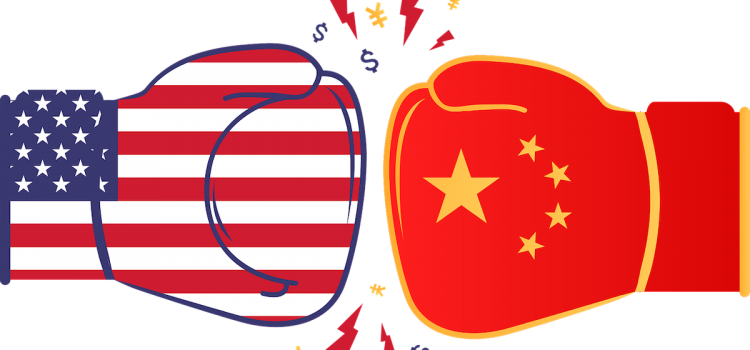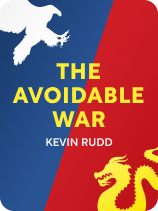

This article is an excerpt from the Shortform book guide to "The Avoidable War" by Kevin Rudd. Shortform has the world's best summaries and analyses of books you should be reading.
Like this article? Sign up for a free trial here.
What would happen if the US went to war with China? Is war with China inevitable?
As tensions between the US and China threaten to escalate, Kevin Rudd argues that a full-blown military conflict can and should be averted. He shares his recommendation for how these two global powers can avoid full-on war—an outcome that would take a huge toll on the US and China as well as global stability.
Read more to learn the potential consequences of a war between the US and China and how to avoid it.
War Between the US and China
What would happen if the US went to war with China? Is war with China inevitable? Diplomat and politician Kevin Rudd answers these important questions in his book The Avoidable War. He argues that, if tensions escalate to a military conflict, a war between the US and China would be catastrophic on many levels. He claims that a war would take its toll on both countries as well as the global community, and the risks of war make it worth striving for an alternative. Rudd’s most important reason to avoid war is the loss of human life that would result from military conflict.
In addition, Rudd writes that both countries would pay a high economic price if they waged war (for weaponry, equipment, and deploying troops), a war would cause global instability by potentially pulling other allies into the conflict, and both countries would risk losing domestic political power and global prestige if they lost the war or failed to decisively win.
| The Economic Pros and Cons of a War Between the US and China Although Rudd highlights the high economic cost of war for both countries, others argue that economic pressure is also the most likely to motivate the US and China to start a war. Both countries want access to the semiconductors manufactured in Taiwan, so China might escalate the conflict by seizing control of the industry through military action on Taiwan, and the US might escalate the conflict to maintain its access to semiconductors by militarily defending Taiwan. The desire for access to this industry could potentially outweigh the other risks that Rudd describes. On the other hand, some argue that even if the US won an initial military conflict against China over Taiwan, it could become an extremely costly defense effort to protect Taiwan in the long term against any future attacks. In addition, one analyst argues that the most likely outcome is that China defeats the US in a conventional military confrontation in the Pacific, or in the worst-case scenario, mutual nuclear attacks could ensue. Another writer argues that a prolonged war with China would have broad impacts on Americans domestically—most importantly, it would devastate the US economy if trade halted between the two countries. |
A Three-Part Diplomacy Plan
Rudd’s recommendation for avoiding a war between the US and China is a form of diplomacy he refers to as “strategic managed cooperation.” His vision for US-China relations has three key parts: establishing clear conditions (what Rudd calls “redlines”) that neither side can violate without risking war, allowing economic and political competition to carry on as usual, and collaborating in areas where it’s mutually beneficial, such as combating climate change.
Although Rudd acknowledges that his plan might appear naive, he also asserts that it’s the best alternative that each country has to avoid a catastrophic conflict. He says that by avoiding it long enough through explicit agreements, political relations might improve organically over time.
(Shortform note: Despite ongoing accusations and sanctions, the US recently announced that it’s ready to resume high-level diplomatic talks with China to improve communication. As of spring 2023, it’s unclear whether China will be willing to re-engage with the US in the way that Rudd envisions.)
#1: Establishing Clear Boundaries
Rudd’s first component of the diplomacy plan is the most important for preventing one country’s actions from accidentally sparking a full-on war between the US and China. His idea is for both sides to be transparent about actions that are unequivocally off-limits, and importantly, these boundaries have to be verifiable so that each country can monitor the other.
(Shortform note: This aspect of Rudd’s plan might be more difficult in practice than in theory. Many of the recent accusations by China and the US are theoretically “verifiable,” but both countries have still denied the claims of the other. For example, when the US accused China of illegally entering US airspace with a surveillance balloon, China responded by saying it was a civilian meteorological research airship.)
Rudd suggests, for example, that both countries might ban cyberattacks on critical infrastructure. China might insist that the US end diplomatic visits to high-ranking government officials in Taiwan—visits that Rudd says needlessly provoke China. The US, on the other hand, might insist that China allow free movement of sea and air vessels in the South China Sea. By establishing these clear boundaries, each country will understand what actions warrant military retaliation—much like a set of high-stakes ultimatums.
(Shortform note: Rudd’s ideas for mutual ultimatums might be particularly hard to implement with regard to Taiwan. As we mentioned previously, reunifying with Taiwan is a core priority of Xi and the CCP, and it also represents a key interest for the US, since Taiwan supplies it with semiconductors. In addition, the US is obligated by the Taiwan Relations Act to provide Taiwan with the means to defend itself against a military attack by China. Given these opposing interests, it’s unclear whether this issue could be resolved through explicit agreements.)
#2: Allowing Normal Competition
Under Rudd’s framework, as long as the US and China didn’t violate the conditions described in the previous section, both countries could continue to engage in economic and political competition without escalating tensions. Economically, this includes activities like competing for access to each other’s consumer and investment markets and tailoring trade policies to their own advantage. Rudd explains that the US and China could continue competition at the ideological level as well—the US promoting democracy and free market capitalism and China promoting its economic development based on authoritarian capitalism.
(Shortform note: This aspect of Rudd’s plan isn’t much different from what’s currently happening economically between the two countries. The main distinction from the present is that Rudd seems to imply that under this new agreement, economic competition wouldn’t be perceived as an act of aggression. The US and China resolved the 2018-2019 trade war through mutual agreements, although some experts point out that some of these agreements have been made (and broken) previously.)
#3: Collaborating on Key Global Issues
The last part of Rudd’s diplomacy plan is for the two countries to collaborate when it comes to mitigating global challenges such as climate change and nuclear proliferation. Rudd contends that since climate change threatens the long-term economic stability of both countries, and widescale reduction of carbon emissions is critical, both would benefit from collaborative action.
(Shortform note: One estimate suggests that climate change could reduce the global GDP by up to 18% by 2050 (due to the loss of natural resources and the impact of extreme weather events). An example of an opportunity for the US and China to collaborate on this issue is the Presidential Net-Negative Emissions Moonshot—a program in which scientists from the US, China, and other countries would work together to create innovative technologies that remove carbon from the atmosphere.)
In addition, Rudd writes that the US and China would benefit from preventing countries such as Iran and North Korea from producing nuclear weapons. Nuclear weapons are a threat to the national security of both the US and China and give other countries more political leverage since they can threaten a nuclear attack. Rudd suggests that the US and China could collaborate on this issue by both ratifying the Nuclear Test Ban Treaty and negotiating other agreements to maintain the status quo in terms of nuclear weapons development.
(Shortform note: The Comprehensive Nuclear Test Ban Treaty is an agreement created by the UN in 1996 that bans all nuclear explosions. However, the agreement doesn’t go into effect unless 44 specific countries with nuclear capability sign and ratify it. As of early 2023, China, the US, and six other countries on that list had not ratified the agreement.)
Exercise: Reflect on the Possibility of War Between the US and China
Reflect on how Rudd’s ideas have changed your understanding of this politically complex situation and how it might unfold in the future.
- Based on the contributing factors to tensions between the two countries (like cyberattacks, military encroachment, the trade war, and so on), what kind of events do you think are most likely to spark a full-on conflict between these two nations?
- Rudd suggests a three-part diplomacy plan to delay a potential war: establishing firm, verifiable boundaries that each country must comply with, allowing economic and ideological competition to carry on, and collaborating on key global issues like nuclear proliferation and climate change. Which of these do you think will be the most challenging to achieve and why?

———End of Preview———
Like what you just read? Read the rest of the world's best book summary and analysis of Kevin Rudd's "The Avoidable War" at Shortform.
Here's what you'll find in our full The Avoidable War summary:
- The complex factors contributing to hostility between the US and China
- How a military conflict between the US and China can be avoided
- The huge toll a US-China war would take on global stability






